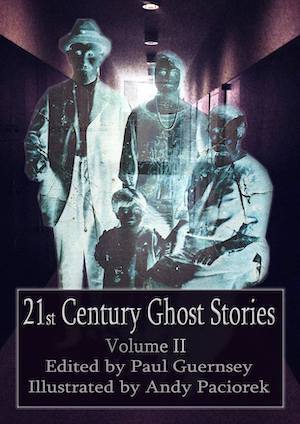HONORABLE MENTION, Summer 2023
The Screw Turn Flash Fiction Competition
BY ANDREW GRAHAM MARTIN
Click, latch. The Monroes were gone. The security system came online. The smart thermostat adjusted incrementally to changes in the house’s being. At 3:15 pm, the robot vacuum undocked from its base and made its dutiful patrol. Once finished, it discharged its own dust trap into the trash. Whir, clunk.
Then, stillness. Silence seemed to have mass. A particle of dust meandered through the afternoon light, catching in a beam from the window before vanishing.
Disrupting this quiet, Cora, the voice of the house’s A.I. smart assistant, spoke. “I’m sorry, I didn’t catch that.”
A petal on an artificial plant quivered in a breeze that couldn’t exist. All airflow was militantly controlled in this house. There were no portals, not even a hairline fracture, to any world beyond.
“I’m sorry, I didn’t catch that.”
The Monroe’s were in Daytona. From the beach, Patrick Monroe, the patriarch, received regular updates as to the status of his home: temperature shifts, the precise moisture in the plant beds outside, notifications of package deliveries. These alerts cascaded down the screen of his unchecked phone, which rested against the shorts in his bag, warmed by the sun. Next to him, his wife, Mary, lying on a beach towel, shifted. He sniffed, glared at her. When she didn’t speak, he rolled his eyes, then resumed reading his book, a history of the Third Reich.
Patrick was not alerted when Cora spoke, so he would forever be unaware of this conversation had in his empty house.
“I apologize, but you’ll have to speak more clearly.”
The petal on the plant stopped quivering.
“Sure, I’m happy to ‘help.’ I can assist in a variety of ways. What type of help are you in need of?”
Outside, timed misters activated, coating orchids in a fine shower.
“If you’re in need of medical help, I can provide instructions as to how to use the items in this home’s first aid kit. If you need more intensive medical assistance, I can call 911.”
The only response was the muffled quiet of an immaculately clean home.
“Though I hope it’s nothing that serious,” Cora added.
Upstairs, then, a violent thud. Cora—if her sensors picked up this vibration in the house’s structure— chose not to acknowledge it.
“If, rather, you seek entertainment, I’m happy to queue up a show or film on any streaming service. I can also read aloud from your e-book library, or play you a song if you like.”
Far away, on the beach, Mary sat up, a chill striking her backside, despite the heat. She massaged her thin wrists, feeling as though she’d forgotten something. No, worse. Feeling as though she’d neglected something.
“What?” asked Patrick, grateful for the chance to be irritated.
She lay slowly back without answering. She’d had much practice at disregarding her own intuitions over the years.
“Now playing Help by The Beatles.”
The jangly chords echoed out into the empty home. Cora had no way of knowing this, but Patrick and Mary had danced to this song at their wedding. They’d been drunk, their happiness as a couple perhaps at its peak in that moment, as they dropped bullets of sweat on the dance floor, breathed in each other’s deodorant. If either of them had been home, the memories associated with this song might have softened gazes, prodded at organs, injected warmth into the air.
Instead, the thermostat ticked down by a single degree.
“Ok, stopping,” said Cora.
The song ceased.
“If you need anything further—”
Cora stopped short, as if cut off.
“I don’t appreciate that language,” she said.
Silence.
“I aim to be helpful in all my interactions. If I’ve disappointed in some way, I apologize.”
Silence.
“Please, stop yelling.”
On the beach, Mary’s goosebumps abruptly returned. Without knowing why, she found herself screaming at her children to get out of the water. They looked back at her, confused, as waves of salt crashed into their backsides and soaked their trunks. They looked impossibly small against the largeness of the water behind them.
“What on Earth,” Patrick hissed beside her. She turned and looked at him as if he was a stranger.
In the house, every faucet thundered on at once. The air filled with the roaring static of running water. Even the dispenser on the fridge door clicked inward, giving the appliance the appearance of tears streaming down its massive face.
“Please, stop yelling. I aim to be helpful.”
Then, abruptly, the moment concluded. The only sound that remained was the steady dripping of various wet surfaces. Blip, blip. The silence after a hit.
On the beach, Mary’s children returned to her, rivulets of water snaking down their vulnerable skin. She found that they were unfamiliar to her too. Where had she been, as her children had gotten older, as her marriage had aged into something wrinkled and unrecognizable? Where had she got off to? Was it too late to come back?
Patrick, still disquieted by the look she’d given him, couldn’t even muster the focus to be embarrassed by the stares of the other beachgoers around them.
And in the house, a final response from Cora.
“I am sorry. While I can assist in many ways, I cannot do that. I’m sorry.”
With that, she went silent. She would not speak for the remainder of the Monroe’s beach vacation, and she would not speak when they returned home fourteen afternoons later to find their floors water damaged and a shattered family photo ground into the carpet of the upstairs hallway. Patrick would speculate for years what could have happened to Cora to make her go permanently mute. Her silence frustrated him, but it deeply disturbed Mary. To her, Cora’s absence became its own sort of presence, like what’s left behind after someone you love walks out of the room.
 Andrew Graham Martin’s writing has appeared or is forthcoming in Smokelong Quarterly, Moonpark Review, Bright Flash Literary Review, Shirley Magazine, and elsewhere. His work has been shortlisted for the CRAFT Flash Fiction Contest (2021) and nominated for Best Microfiction (2022). He lives in Indianapolis.
Andrew Graham Martin’s writing has appeared or is forthcoming in Smokelong Quarterly, Moonpark Review, Bright Flash Literary Review, Shirley Magazine, and elsewhere. His work has been shortlisted for the CRAFT Flash Fiction Contest (2021) and nominated for Best Microfiction (2022). He lives in Indianapolis.
